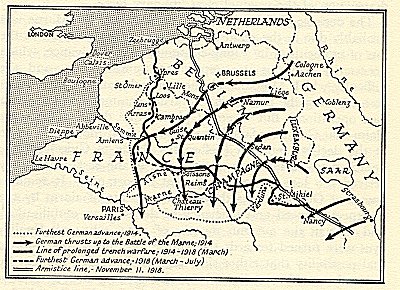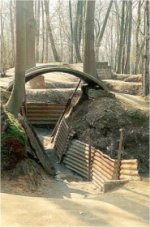1914 to 1918
Causes of the Great War
To gain a better
understanding of the causes of the First World War, one must first
realize that the hostilities were an outcome of years of build-up and
diplomatic gamesmanship. The immediate reason for the hostilities was the
assassination of the Archduke Franz Ferdinand of the Austro-Hungarian Empire
but this was merely the act that detonated an existing explosive situation.
One can discuss causes at great lengths but in my opinion the greatest
factor to the start of the First World War – or most other wars in fact – is
the belief that a war is possible to win. No country enters into war unless
it is felt that success is in sight. The nations that began hostilities in
1914 did so believing that they could overcome their enemies. When a country
reaches a point of such confidence, peace is in jeopardy.
The System of Alliances
Europe had developed a system of agreements or friendships that would boost
the belief of some countries that they were invincible and for other nations
that they could withstand any attack.
The Triple Alliance
comprising of Germany, Austria-Hungary and Italy held the central portion of
Europe while being surrounded by the Triple Entente: Great Britain, France
and Russia.
After the assassination of Franz Ferdinand, Germany made it clear to the
leadership of the Austro-Hungarian Empire that they had a “blank cheque”
supporting their every move. Should Russia, as expected, support Serbia,
they would be countered by the German army if needed. Austria-Hungary blamed
the Serbs for their support of the “Black Hand” terrorists and wanted
revenge and a chance to "trim back" the Serbian government.
Russia as expected, supported the Serbs and called for a mobilization of the
army. France had been an ally of Russia since 1894. Great Britain had been
an ally to France since 1904 (the Entente Cordiale) and by 1907 had formed
the threesome with Russia: the Triple Entente. Russia provides a huge army
and the potential of a two-front war, France boasts a large modern army and
in Britain we find the world’s greatest naval force.
Germany had the army, the modern equipment, the will to fight and a plan.
The Schlieffen Plan *
General Count Alfred von Schlieffen, who had been the Chief of Staff for Germany from 1891 to 1905, had formulated a plan of attack should war with France erupt. The plan called for a very strong German attack along the right flank of France, crossing through Belgium, touching the English Channel and sweeping through the north-west, engulfing Paris and forcing a French surrender. The plan called for speed, ruthlessness and a gamble.

It was assumed that any war fought on the eastern front with Russia would
not
have
developed into a fully mobilized assault on Germany in time, that the French
army would be surprised and out-flanked on the Franco-German frontier and
that the invasion of Belgium would be uncontested and only a matter of
marching. General
Helmuth von Moltke,
von Schlieffen’s successor planned on using the essence of the strategy but
had tinkered with the specifics to a dangerous end. Nervousness on the east,
not traveling south of Paris but chasing the French army to the east of
Paris and the bravery of the Belgian army had all worked to shake the
foundations of Schlieffen’s original plan.
The British had signed a treaty back in 1839 guaranteeing the neutrality of
the Belgians. Although the British very attached to the Russians and the
French through the Triple Entente, it was the shock of the invasion of
Belgium that seemed to have pushed the British people and therefore, the
British Empire into the hostilities.
As Europe entered into the fall of 1914 the great armies of Germany, Austria-Hungary, Russia, France and Great Britain
were entering into a stalemate. No nation had advanced enough to ensure
victory. Belgium, save the western region of Flanders, had been conquered by
a vengeful German army. Northern France had been over-run. The German army
could afford to strengthen defences, tighten up their lines and wait for the
offensives of the allied forces, attempting to liberate lost territories. As
the trenches extended hundreds of kilometres from the English Channel to the
frontier of Switzerland, it was soon to be realized that the soldiers of
each side were about to pay the price for the recklessness nationalism and
short-sighted diplomacy of their leaders.
great armies of Germany, Austria-Hungary, Russia, France and Great Britain
were entering into a stalemate. No nation had advanced enough to ensure
victory. Belgium, save the western region of Flanders, had been conquered by
a vengeful German army. Northern France had been over-run. The German army
could afford to strengthen defences, tighten up their lines and wait for the
offensives of the allied forces, attempting to liberate lost territories. As
the trenches extended hundreds of kilometres from the English Channel to the
frontier of Switzerland, it was soon to be realized that the soldiers of
each side were about to pay the price for the recklessness nationalism and
short-sighted diplomacy of their leaders.
In Canada, those who would volunteer to “do their part” for the effort had
little suspicion of what the future held.
* Schlieffen Plan map, page 203, Derry, T.K. and Jarman, T.L. The European World 1870-1961,
London, G.Bell & Sons Ltd., 1968
last updated: January 2011

